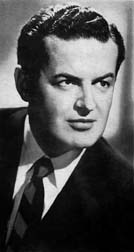
Hugo Winterhalter
| Land of Dreams | |
| The Magic Tango | |
| Song Of The Barefoot Contessa |
Easy listening arranger and composer Hugo Winterhalter was born August 15, 1909 in Wilkes-Barre, PA, later studying violin and reed instruments at the New England Conservatory of Music. After graduating, he taught school for several years before turning professional during the mid-1930s, serving as a sideman and arranger for Count Basie, Tommy Dorsey, Raymond Scott, Claude Thornhill and others. Winterhalter also arranged and conducted sessions for singers including Dinah Shore and Billy Eckstine, and in 1948 he was named musical director at MGM. After a two-year stint with the label, he moved to Columbia, where he scored a hit with his orchestral reading of "Blue Christmas."
In 1950, Winterhalter signed on with RCA Victor, where he arranged sessions for acts including Eddie Fisher, Perry Como and the Ames Brothers; he also headlined a series of instrumental albums, among them 1952's Great Music Themes of Television, one of the first collections of TV theme songs ever recorded. Other LPs included
The Two Sides of Hugo Winterhalter (reflecting both his big-band and light-classical interests), Big and Sweet with a Beat and a series of Hugo Winterhalter Goes... albums, which explored various international styles. Winterhalter also notched a series of chart hits, including "Blue Tango," "Vanessa," "The Little Shoemaker" and "Song of The Barefoot Contessa"; with pianist Eddie Heywood, he even reached the number two spot with 1956's "Canadian Sunset."
Winterhalter remained on the RCA payroll until 1963, at which time he jumped to Kapp; that same year, he also penned the main title theme for the film Diamond Head. At Kapp he recorded a handful of albums including The Best of '64 and its follow-up, The Big Hits of 1965, before exiting the label to work on Broadway. He later worked in television as well, and continued recording the occasional LP for budget labels including Musicor. Winterhalter died in Greenwich, CT on September 17, 1973.